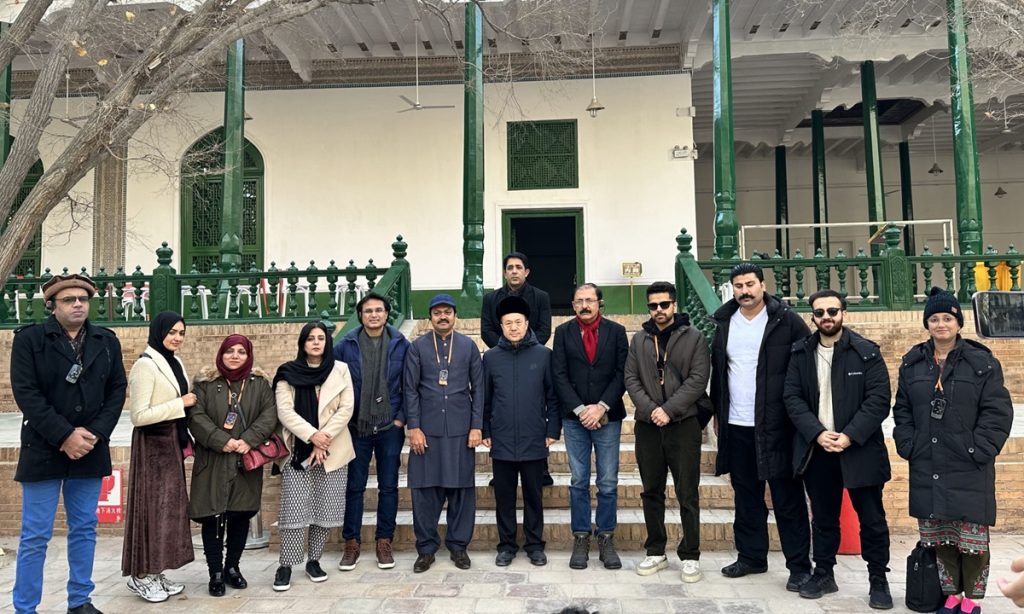Development of Xinjiang impresses Pakistani media and think tank representatives

During a five-day on-site visit to Northwest China's Xinjiang Uygur Autonomous Region, 15 representatives from media and think tanks in Pakistan witnessed the development situation in the region. One of the most impressive aspects for them was the development of Muslims in Xinjiang and the religious freedom they enjoy, according to journalists and scholars who spoke to the Global Times. They called for more people who have misunderstandings about Xinjiang to visit the region.
In Xinjiang, the delegation visited the Id Kah Mosque in Kashi and the Xinjiang Islamic Institute in Urumqi, and stayed, observed, and talked at length to the Imam and the director at these two religious facilities.
The Id Kah Mosque is located in the old town of Kashi. It has a long history and is also a representative example of Uygur architectural art. In recent years, the Chinese government has allocated a large amount of funds to renovate the mosque, providing good conditions for religious believers. The Xinjiang Islamic Institute was established in June 1987 and currently has a student body of around 1,000. It is the only religious higher education institution in Xinjiang and has eight branch campuses.
"Everyone has heard so many of the propaganda stories against Xinjiang," Moiz Farooq, an executive editor of Daily Ittehad Media Group, told the Global Times. "Now finally we have seen the truth, and it is great to say that seeing is believing."
Farooq said that he is particularly impressed by the fact that there are currently about 1,000 students studying full-time at the Xinjiang Islam Institute, where they receive an undergraduate education and a BA degree and a job in the religious field after graduation.
"It is very happy for me to see the Muslims in Xinjiang are enjoying all the freedom," he said. "They have freedom to practice in religion over here, with the best facilities in the institute."
After the visits to the Id Kah Mosque and the Xinjiang Islam Institute, Yasir Habib Khan also said that he has gained a clearer understanding of China's policy on religious freedom.
"In accordance with Chinese law, every religion is treated equally, which is very encouraging," he said. "Some Western media have repeatedly attempted to demonize China and fabricate false information about Chinese Muslims, but seeing is believing - Muslims in Xinjiang can fully engage in normal religious activities according to Islamic doctrines."
"Setting foot on the ground and making close observations in Xinjiang, it is testified that Uygur Muslims in Xinjiang are completely free to live their normal lives practicing Islam in its true spirit," Khan wrote in his column.
"Those who make unfounded remarks should come to Xinjiang in person and see the real situation here," he said.
Sayed Kalbe Ali Naqvi, a senior reporter from Dawn newspaper, also noted that the real Xinjiang is far different from the false propaganda and portrayals by Western media.
In the past, he thought Xinjiang was a small and underdeveloped border town, as is described in many foreign media reports. But upon setting foot on this land, he discovered that it is much more prosperous and lively than he imagined, with a vast territory and a large population.
Naz Parveen, editor of the Daily Kasoti and The Window of China, described snow-covered Urumqi as romantic - with winding flyovers and towering buildings not far from hazy snow-capped mountains, far surpassing her imagination.
"The development of Urumqi is beyond imagination," said Fahd Gauhar Malik, editor of Pakistan Observer, who had previously learned about Xinjiang mainly through media reports. Upon arrival, he discovered that Urumqi is filled with high-rise buildings, well-developed infrastructure, and people living and working in peace and contentment, completely the opposite to the so-called "backwardness" reported by Western media.
"I can see that people living in Urumqi are very happy," he said.
"Beautiful Xinjiang deserves to be promoted to the world," said Mahzaib Abbasi, a Pakistani online influencer who has been living and studying in China for seven years. "I want to share the wonderful experience in Urumqi as soon as possible and showcase the real Xinjiang through my videos."
During their five-day visit to Xinjiang, a delegation of 15 representatives from Pakistani media and think tanks also visited Kashi Old Town, Jiashi water safety engineering facilities, a prune industrial park, Xinjiang Mustang Ecological Park, the Urumqi International Land Port Zone, and the International Grand Bazaar.
The delegation visited China from December 6 to 16, travelling from Beijing to Chengdu, Southwest China's Sichuan Province, and Kashi and Urumqi in Xinjiang.